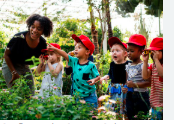Spending time outside isn’t just fun for young children—it’s also an important part of early learning. Outdoor environments offer exciting opportunities for exploration, discovery, and development. When preschoolers engage in outdoor activities, they build physical skills, expand their imaginations, and strengthen their understanding of the world around them. Here are some enjoyable and educational outdoor learning activities designed especially for preschoolers.
1. Nature Walk and Talk
Take children on a walk around the schoolyard, park, or neighborhood. Encourage them to notice birds, plants, clouds, or insects. Ask open-ended questions like, “What do you see?” or “How do you think that tree got so big?” This promotes observation skills, vocabulary building, and curiosity.
2. Alphabet Treasure Hunt
Hide alphabet cards or lettered objects in outdoor areas. Invite children to find letters and say words that begin with each one. This playful activity supports early literacy and letter recognition while keeping kids moving and engaged.
3. Garden Exploration
Let children help plant flowers, herbs, or vegetables in a small garden bed or pots. As they dig, water, and watch their plants grow, they learn about responsibility, seasons, and life cycles—all through hands-on experience.
4. Sensory Play with Natural Materials
Create a “nature sensory table” outdoors using safe materials like leaves, sand, pinecones, or small stones. Children can sort, touch, and describe what they find. This supports fine motor skills and language development.
5. Shadow Tracing
On a sunny day, invite children to trace their shadows—or the shadows of toys or leaves—with chalk on the pavement. This simple activity introduces concepts like light, space, and time in a fun and visual way.
6. Music and Movement Time
Play music outside and encourage children to dance, skip, or mimic animal movements. Outdoor movement activities help improve coordination and allow children to express creativity freely.
7. Water Play Discovery
Offer safe water tables, spray bottles, or small buckets of water for supervised play. Children can experiment with pouring, measuring, or floating objects—helping them develop math and science thinking skills.
8. Story Time Under the Sky
Choose a shaded spot for reading time. Listening to stories in an outdoor setting adds a sense of wonder and helps children associate books with enjoyment in many environments.
9. Building and Balancing Games
Use natural materials like sticks, stones, and logs for stacking, sorting, or balancing. These activities strengthen problem-solving and motor planning in a hands-on way.
10. Art in Nature
Provide paper and crayons for leaf rubbings, or paintbrushes and water for painting on sidewalks or fences. Artistic outdoor expression encourages creativity while fostering a love for nature.
Final Thoughts
Outdoor learning supports whole-child development—physically, emotionally, socially, and intellectually. By offering thoughtful, age-appropriate activities, educators and caregivers can turn any outdoor space into a dynamic classroom. Whether it’s a short nature walk or a day of garden play, outdoor learning experiences help preschoolers grow with joy, confidence, and curiosity.














